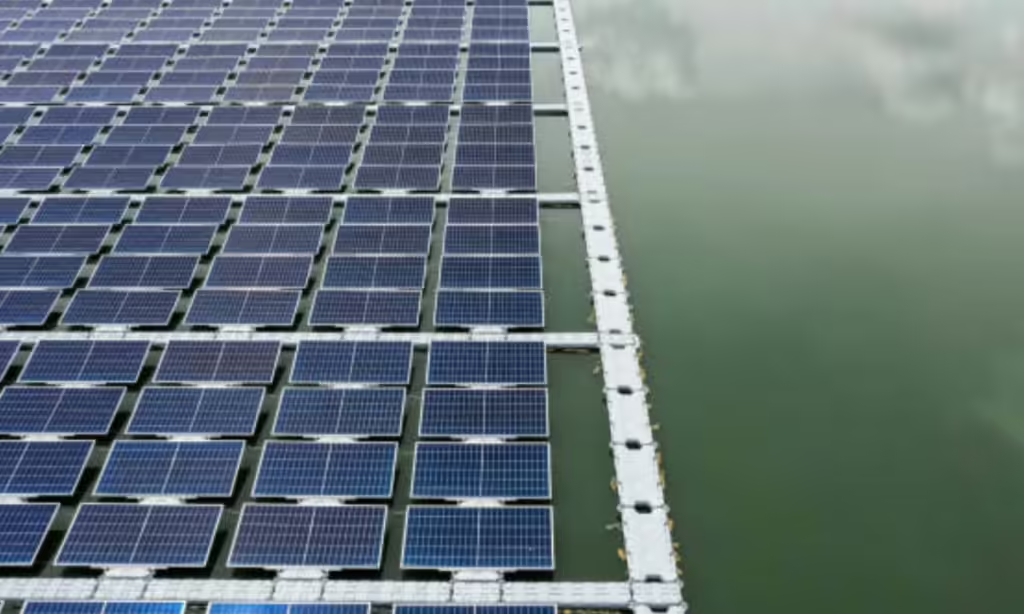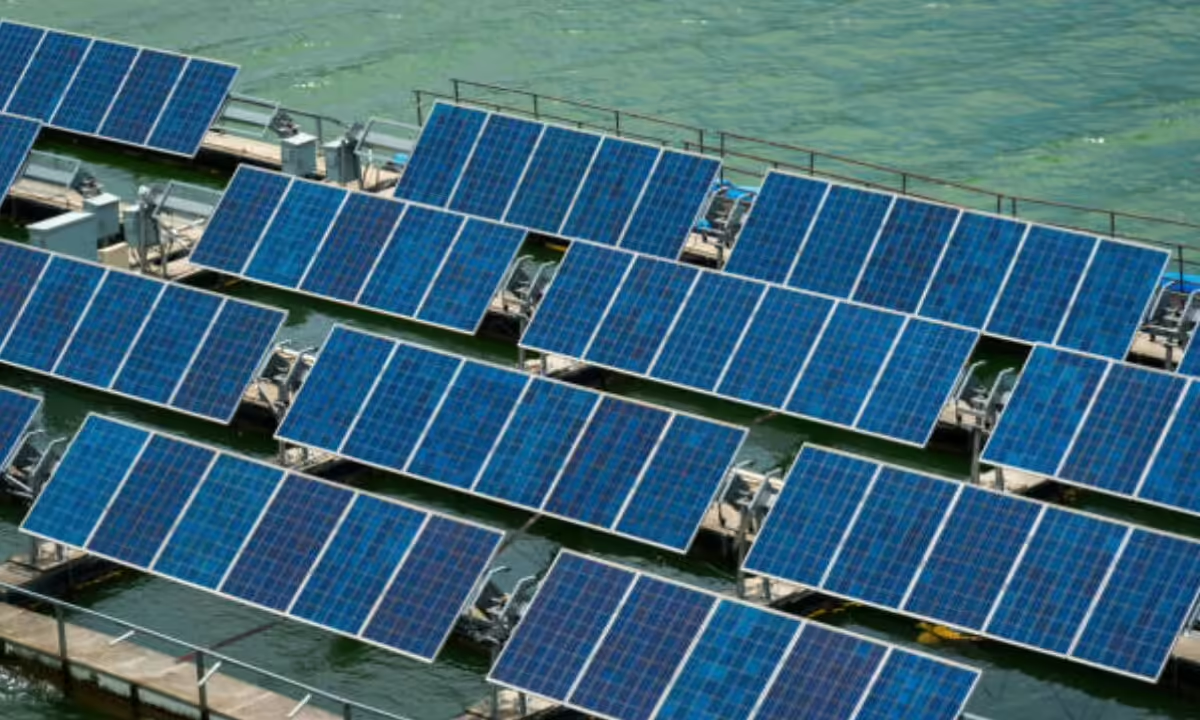India is focused on changing its energy framework by advancing floating solar power systems. This efficient strategy sits solar panels on water surfaces to optimize area and conserve soil. With the country simultaneously confronting higher energy consumption and environmental threats, floating solar power serves as an effective answer.
Exploring Floating Solar Power Plants

These solar energy systems consist of panels supported by water surfaces. Floating solar installations have solar panels installed on foundations above water. This technology has gained traction due to its dual benefits: yielding green energy and making the most of water spaces that remain idle.
How Do They Work?
Floating solar power plants operate in a way that resembles ordinary solar farms. By using photovoltaic cells solar panels transform sunlight into electrical energy. The generated power can either supply the grid or be used locally according to the arrangement.
Benefits on Solar Power Systems on Water
1. Land Conservation
In India’s fertile fields competing against energy development and farming is common. Valueless land isn’t necessary for floating solar power installations that can be placed on already available water bodies. Agricultural development and protection of ecosystems can occur through land space conservation.
2. Enhanced Efficiency
By being adjacent to water bodies solar panels can reach lower temperatures and increase their efficiency. With higher temperatures, solar panels could reduce their effectiveness. Water has the potential to improve energy yield in floating solar systems through its natural cooling.
3. Reduced Water Evaporation
Fluctuating solar panels add to minimizing evaporation in water reservoirs. In areas with severe shortages of water, this assists greatly. When placed on water surfaces floating solar energy systems assist in keeping water quantity stable and managing it better.
4. Alleviating Pollution
Floating solar energy solutions effectively decrease water body contamination. By blanketing the surface they diminish algae growth and manage other water concerns. Production of cleaner energy benefits from this while improving the water ecosystems.
Floating solar power’s current role in India
In India, there has been a notable advancement in implementing solar technology floated above water. Across the country, several experimental efforts have taken place to demonstrate the effectiveness and practicality of floating solar systems.
Leading Projects
Established in 2015 near the Khadakwasla Dam in Pune lies an influential pilot floating solar facility. This installation has shown how this technology can meet energy needs with its 1 MW capacity.
Kerala’s Sabarigiri Power House launched a floating solar plant that produces 500 kW of electricity. These ventures demonstrate the rising curiosity and financial commitment to exploiting floating solar solutions.
Government Initiatives
By recognizing potential benefits floating solar power receives encouragement from Indian authorities through policies and incentives. The MNRE outlined policies to develop research in this sector and to motivate various investments from both private entities and the government.
Challenges to Overcome
Advantages are present in floating solar power plants; however, they also deal with different challenges.
1. High Initial Costs
Floating solar power systems can cost significantly more than conventional solar farms because of the unique engineering needs required for their setup. With advancements in technology and the growth of economies of scale, costs are anticipated to fall.
2. Maintenance Issues
Due to the placement of floating solar panels specific upkeep procedures may be required. Protecting the strength of devices in challenging water conditions while respecting algae needs careful thought.
3. Environmental Concerns
Although floating solar arrangements can bring ecological gains sites must be chosen with care to avoid settling any harmful impacts on the local environment. Inviting stakeholders and executing detailed environmental reviews play important roles in the planning strategy.
Development of Floating solar power in India
To reach its renewable energy objectives India has positioned floating solar power as a vital element of its energy strategy. To reach 500 GW of renewable energy by 2030 in the country a unique chance arises for floating solar technology.
Involvement from the Community
Engaging residents locally is essential for the growth of floating solar projects. Understanding how floating solar works can build acceptance and support. Projects that receive community feedback align with local demands and benefit the environment.
Future Potential for Partnerships, Growth, and Collaborations
Large reservoirs and coastal zones in India create a vast resource for developing floating solar technologies. This pioneering technology can help India improve its energy safety with the right investment and assistance from regulations.
Collaborations between research organizations and both private firms and government entities could shape the growth of floating solar energy in India. By pooling resources and technology together stakeholders can promote the growth of floating solar systems.
Innovation and Research
Investigations into floating solar technologies will create better designs and installation practices. By partnering with stakeholders from the industry and research organizations innovation can be increased and costs may be lowered while reliability is enhanced.
Conclusion
By adopting floating solar systems India not only supplies a fresh and responsible way to satisfy its rising energy demands but also manages environmental impacts effectively. With the extensive water resources at its disposal, India can maximize solar panels efficiency which supports its renewable energy targets. Strategically invested resources and advocacy for policies make floating solar power a key player in creating India’s energy horizon.
India’s renewable energy framework gains momentum from the emergence of solar energy systems on aquatic sites. Land conservation and improved efficiency along with reduced pollution make them important for progressing toward sustainable practices. Through this technology’s use, India can showcase its commitment to innovative techniques for tackling energy problems.
By integrating solar panels easily and effectively into their services Sun-AP Ecopower seeks to deliver renewable energy alternatives. So, directly reach out to discuss your requirements.




